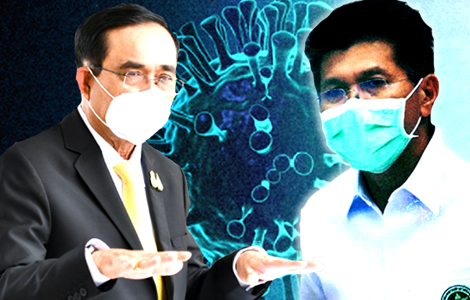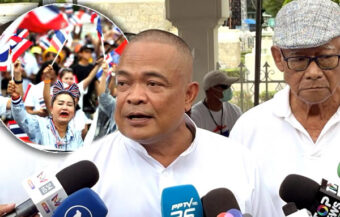Officials are emphasising the need for no panic as Omicron has landed. Prime Minister Prayut Chan ocha, over the weekend, reached out to the nightlife industry saying that the cabinet would approve measures shortly either through social welfare channels or direct payment to assist business owners and workers in the trade which he said was as important as any other in the current effort to restore Thailand’s shattered economy. It comes after controlled alcohol sales have resumed in Pattaya and other tourism hotspots from Friday through certified establishments. In the resort city, once famous as one of Asia’s top tourist destinations, tourism leaders are pointing out that the former holiday haven has received, so far less than 1.2% of its normal level of visitors since November 1st last.
The Omicron variant’s arrival in Thailand was announced on Monday just hours after Deputy Minister of Public Health, Satit Pitutacha, speaking on Sunday, predicted it was only a matter of time. He predicts that there will be a surge of infections within one to two weeks but has made it clear to the public that the government is fully prepared for the situation with officials hoping to avoid disruption to the current reopening process. Over the weekend also, Prime Minister Prayut Chan ocha struck an apologetic tone as he explained to workers and business owners in Thailand’s nightlife industry why a decision on reopening these sorts of venues has had to be deferred. Both the PM and Minister Satit made it clear that the government is aware of the suffering of the public and those trying to earn a livelihood who have endured so much. General Prayut explained that the priority, from this point on, will be to balance both public health and the right of people to earn a livelihood ahead of the next COVID-19 storm called Omicron.

Deputy Minister of Public Health Satit Pitutacha said on Sunday he believed it was a certainty that the Omicron virus strain will land in Thailand and estimated a timeframe of a few weeks.
It did not take long. On Monday, the Ministry of Public Health announced that a US businessman who travelled to Thailand via Spain had tested positive for the new variant B.1.1.529.
The announcement was made by Department of Medical Sciences director Supakit Sirilak. The Omicron strain was detected in the 35-year-old American using a PCR test.
Passenger flew in last Monday the 29th on Emirates Airline flight EK372 into Suvarnabhumi Airport
The passenger arrived on Emirates Airline flight EK372 at Suvarnabhumi Airport from Dubai on November 29th. He showed no symptoms of the disease.
He had a negative PCR test on Sunday, November 28th before flying and was vaccinated with one dose of the Johnson and Johnston one-shot vaccine.
It is understood that the visitor had lived in Spain for one year according to a briefing attended by Dr Opas Karnkawinpong of the Department of Disease Control who told his audience that the chances of the passenger having the Omicron variant were 99.92%.
The top official told the media that the detection of the virus strain shows the imperative of the government maintaining PCR testing for incoming foreign tourists.
He also said that this probably means that further people are infected.
‘If there is one case, we believe there will be the second and third cases,’ he explained.
US top medical advisor Dr Fauci says Omicron strain is less severe than the Delta strain that is still dominant
Dr Opas said that officials believe the man had been in contact with two airport staff and seventeen members at the hotel he was staying at.
It comes as the Thai Ministry of Public Health has also announced that it currently believes that existing vaccines will help prevent serious illness for the disease even if the virus strain generates higher levels of infection.
On Monday also, Dr Anthony Fauci, the White House chief medical advisor, told the press that the US Centers for Disease Control and Prevention believes that the Omicron virus strain is less dangerous than the Delta strain of the disease which is still dominant in both the United States and Thailand.
Immigration Bureau still trying to locate hundreds of African visitors for COVID-19 testing to buy time
In the meantime, the government is still calling on hundreds of African visitors to the kingdom, who arrived after November 15th, to make contact with local authorities for a free PCR test for the virus as it works to keep the situation under control as the country’s foreign tourism reopening process continues apace.
It is understood that, in all, 333 people from eight southern African states from where entry to Thailand was banned from December 1st, entered the country from November 15th to November 27th.
These are South Africa, Botswana, Mozambique, Zimbabwe, Namibia, Malawi, Eswatini and Lesotho.
The government through the Immigration Bureau has tracked down 123 of these visitors with strict instructions to officials to deal with the foreign tourists in a respectful, cordial and welcoming way while explaining the necessity of a further test.
44 tests have so far been conducted and all are reported to have registered negative.
Lockdown measures and other contingencies are being prepared for, only as a matter of last resort
Deputy Health Minister Satit says that all contingencies are being prepared for by the government including, as a matter of ultimate last resort, lockdown measures including the need to provide extra beds and care facilities.
However, officials are reported to be cautiously optimistic that the need for further restrictive measures will not materialise.
‘There is still certainty but at the moment, we still have to look at the information, if it spreads much faster than the Delta. Then one has to look at its properties. If the virus avoids immunisation efforts, that would be a problem. But even if it has these qualities, it may still be considered acceptable. It will still spread fast. But there may still be no severe symptoms. It’s still acceptable, namely the number of infections. When it’s an infection, it may not be severe. When it’s not severe, you don’t need to go to the hospital. You can use home isolation or field hospitals. But we have to wait to see clear information and data first,’ Dr Satit said.
World Health Organisation (WHO) analysing the case data from countries around the world right now
The government is particularly waiting on information from the World Health Organisation which is building up its sample database to get a more accurate understanding of the new variant.
The government minister said key officials are waiting on this data to show information such as anticipated hospitalisation and mortality rates including a profile of those who may be at risk which, in the case of the Delta and Beta waves, was primarily older people and those with underlying diseases.
Current assessment by Thai officials is that the kingdom can cope with a broad spectrum of scenarios
Based on the present assessment without access to the data still required, the officials have assessed that the country is well placed to cope with the Omicron variant.
At the same time, every contingency is being prepared for.
The minister said he was aware that Omicron has already arrived in other Asian countries such as Japan, Singapore, South Korea and lately Malaysia.
Omicron will accelerate fast within two weeks
This is why it was already expected in Thailand before Monday. Minister Satit said the key thing now will be what happens within the first two weeks, how fast will infections grow?
With the Omicron virus, he said infections are expected to rise spectacularly in a matter of one to two weeks.
‘It will not even take a month. In another week or two, it should be, that is, if the infection rate is really high. There will be more every day, at an additional rate.’
TAT says tourism drive will not be impeded
The Tourism Authority of Thailand has also reported that it does not see the Omicron variant, at this point, as a threat to the country’s foreign tourism drive.
It highlighted the fact that Thailand has recently been removed from the list of high-risk countries by Germany making it easier for all returning passengers to the European country to travel home.
Prime Minister is particularly concerned about people involved in the nightlife industry who play a vital economic role as opening of the trade is deferred
On Sunday, government spokesman Thanakorn Wangboonkongchana said that the PM had expressed particular concern about the nightlife trade, its business owners and staff as the government had deferred any decision on reopening this industry for another month.
Officials are now reported to be looking at ways to compensate nightlife and hospitality workers through the social welfare system as well as direct compensation.
The government spokesman emphasised that the prime minister believed that every nightlife worker and the business sector itself had a vital role to play in reviving the Thai economy and pushing it forward at this time.
The spokesman also emphasised the need for caution and public co-operation in observing public health measures to reduce transmission of the virus and not to ‘let the guard down’ at this critical moment.
Priority now is both public health and the ability of people to earn their livelihoods says PM Prayut
On Thursday, General Prayut told reporters himself that at this time, the priority must be both public health and the need to protect people’s economic livelihoods as part of the national economy.
It was in achieving this balance that he felt a decision had to be made to delay the reopening of the nightlife and entertainment industry including music venues, pubs and nightclub shows.
‘We would like to wait and see for a month. In this matter, we must listen to doctors and health authorities,’ General Prayut explained. ‘Enclosed venues where crowds gather and drink pose high risks. That will be put on hold. Assistance measures will be proposed to the cabinet soon.’
Vaccination efforts will continue apace
In the meantime, Deputy Public Health Minister, Dr Satit, emphasised the importance of the country’s ongoing vaccination efforts.
He said the government was particularly prioritising people aged over 60, those with 7 underlying diseases such as respiratory ailments, cardiovascular disease, chronic renal disease, stroke, obesity, cancer and diabetes. The will also be a focus on pregnant women with gestation periods of 12 weeks or more.
He said the response to Omicron must be one of calm and measured preparedness.
Members of the public must also play their part by remembering the importance of wearing masks and using gel to wash hands.
Minister hopes the Omicron variant will be less severe and that the virus will eventually become endemic
His own hope was that Omicron will turn out to be less severe. He said he was aware that the people have suffered enough. He hoped that the COVID-19 virus will become an endemic one with the population having enough immunity to deal with the threat.
The World Health Organisation (WHO) director in the western Pacific, Takeshi Kasaion, on Friday, said that the Omicron variant is moving into Asia and that governments should not be trying to stop it at the border but instead be prepared for it and the possibility of soaring levels of infection.
‘Border controls can buy time but every country and every community must prepare for new surges in cases,’ he told a media briefing. ‘People should not only rely on border measures. What is most important is to prepare for these variants with potential high transmissibility. So far the information available suggests we don’t have to change our approach.’
South Africa where Omicron in weeks has become the dominant strain with a huge spike in infections
The Omicron variant is being studied extensively by scientists in South Africa where they report it has an increased capacity to reinfect those who have already had the disease.
The virus has an ‘ability to evade immunity from prior infection’ according to a preliminary paper published by an executive with the South African Center for Epidemiological Modelling and Analysis Juliet Pulliam working in association with Harry Moultrie of the National Center for Communicable Diseases in South Africa.
Anne von Gottberg of the National Institute for Communicable Diseases on Thursday in South Africa said this: ‘This virus may be similar to Delta in its ability to spread or in being contagious. However, it’s the susceptibility of the population that is greater now because previous infection used to protect against delta and now, with omicron, it doesn’t seem to be the case.’
She said the Omicron variant was now the dominant strain in her country with cases rising from 500 per day two weeks ago to 11,535 last Thursday.
Alcohol back on the menu in tourist hotspots through select outlets and at limited times under new rules
There was some good news for the foreign tourism industry on Friday when alcohol sales were again allowed in key tourist hotspots such as Pattaya, Cha-Am, Hua Hin, Chiang Mai and other areas with blue zone designated status being extended to 26 provinces.
At the same time, local provincial authorities authorised the sale of alcohol from 9 am to 2 pm and 5 pm to 11 pm in most areas. The cut-off point is 10 pm in Cha-Am, a popular resort south of Bangkok, on the coast.
The order also lifts a range of restrictions across many business sectors allowing more flexible business operations including extended opening hours. These include the retail sector, spa and massage shops as well as restaurants.
Business leaders in Pattaya protest just hours before relief was announced on alcohol sales ban on Friday
The relaxations announced on Friday came hours after business leaders in the nightlife area of Pattaya protested at the delay in reopening their industry in the famous Walking Street district of the decimated holiday resort city.
A decision of the local provincial disease committee to permit the sale of alcohol in venues with Safety and Health Administration (SHA) Plus certification for limited hours was seen as some welcome good news.
This regime in Phuket has been exploited by local operators particularly in the Patong area of the island to provide foreign tourists with something like the atmosphere and hospitality that has, in the past, regularly drawn millions of western tourists to Thailand.
Pattaya has recorded less than 1.2% of normal arrivals since the country reopened on November 1st last
Local tourism operators say that under the reopening since November 1st last, the city has only seen less than 1.2% of its normal arrivals from key markets. One operator pointed out that many of these were foreigners with long term connections to the city and not short term tourists at all.
The city welcomed 9,335 visitors from November 1st to December 2nd compared to an average level of 787,000 per month or 1.186% of the levels seen in 2019.
Pattaya welcomed 9.44 million visitors to its nightlife paradise in 2019 before COVID-19 destroyed the scene, once voted one of Asia’s top tourist destinations.
With over 50% of concerns shuttered and up to 10% of those remaining saying openly that they will not be able to trade past February 2022, the long-term future of the resort is under threat.
Hotel bookings are ‘inadequate’ says top boss
Phisut Sae-khu, the President of the eastern chapter of the Thai Hotels Association, in recent days, said that the booking level so far for the end of the year was ‘inadequate’ for the industry and that many of the arrivals were not holiday tourists but people who live in Pattaya simply returning home under less restrictive conditions.
It is hoped that with the easing of alcohol sales restrictions will, at least, help hotels, restaurants and other enterprises begin to offer some sort of hospitality to guests to boost the prospects for Pattaya which up to last week remained essentially a pale reflection of its former self.
Indeed, for the tourism sector, the reopening of Thailand to its former market will not be complete until the nightlife in Pattaya and the nightlife driven hotspots of Bangkok and other key centres in the kingdom come roaring back to their vibrant self.
Alcohol and nightlife are essential tourist attractions
Of course, the understandable problem for the Centre for Covid-19 Situation Administration (CCSA) and public health officials is that it can also mean a new lease of life for the virus.
Nightlife to reopen on a certified basis as officials try to balance public health and the economy
An up to date result of a Thai Examiner survey carried out weeks ago with over 500 respondents now says that 90% of our readers associate tourism in Thailand with the country’s former vibrant nightlife sector with 85% saying the availability of alcohol mattered either or a lot or a great deal to their holiday plans.
Join the Thai News forum, follow Thai Examiner on Facebook here
Receive all our stories as they come out on Telegram here
Follow Thai Examiner here
Further reading:
Thailand pushes ahead with foreign tourism drive, may defer switch to antigen testing over Omicron
Health officials asks for a review of the list of 63 countries allowed to enter without quarantine
Nightlife to reopen on a certified basis as officials try to balance public health and the economy
Thailand Pass is being upgraded but passenger stress stories continue with cancellation threats
Tourism reopening may lose momentum as government pivots back to public health priorities
Incoming passengers vent frustration at problems and bugs with the Thailand Pass system this week
Russian and Indian travellers unhappy at entry rules for November 1st, call for simpler plans
46 countries green-lighted as Thailand’s tourism business is set to take off from November 1st
Bright lights may be turned on again for foreign tourism as hated Certificate of Entry is to be axed
TAT boss: quarantine remains for 1 day to test all visitors, no going back to old tourism pub scenes
PM’s reopening order-only the beginning of the end of this cataclysmic crisis for Thai tourism
Tourism chief again plans to open up Thailand’s rock bottom tourism industry to cryptocurrencies
Dysfunction hits reopening of Thailand to tourism as Health Minister dismisses October 1st date
New normal tourism may see foreign and local tourists segregated at Pattaya tourist attractions
Rising prospect of GDP contraction for 2021 may see government breach the legal public debt limit
Economic fears rising as Thailand faces a bigger crisis than 1997 with rising job losses and debt
Baht falling with confidence in Thailand waning as foreign tourism closure and virus drive funds out
Central bank to lower GDP growth forecast as its attention turns to private sector debt management
Failure to pass the ฿500 billion borrowing decree could lead to the dissolution of parliament
Industry leaders and central bank all warn that foreign tourism must return to avoid a collapse
Fact – only 6,556 visitors arrived in Thailand last month compared to 3.95 million in December 2019
Desperate foreign tourism business concerns are clinging to straws as they try to survive the crisis
Challenge of the virus and closure to tourism leads to major long term changes in the Thai economy
Finance Minister says economy must pivot away from tourism with a switch to S-Curve industries
Strengthening baht predicted as investors bet on a reopening of Thailand to mass tourism in 2021
Thailand facing a credit crunch as 3rd virus wave craters the kingdom’s economic recovery plans
3rd virus wave now spells not just economic loss but financial danger as kingdom’s debt level rises
Still time to avoid lockdown says Health Minister as 3rd virus wave dwarfs all infections to date
Reopening of Phuket still not officially approved although it is the ideal test for a broader move
Minister urged not to be afraid to borrow in 2021 as fears grow for a quick foreign tourism revival
Economy to rebound as the year progresses driven by exports and a return of mass foreign tourism
Door closing on quick foreign tourism return as economic recovery is delayed to the end of 2022
Fact – only 6,556 visitors arrived in Thailand last month compared to 3.95 million in December 2019
Desperate foreign tourism business concerns are clinging to straws as they try to survive the crisis
Finance Minister says economy must pivot away from tourism with a switch to S-Curve industries


















